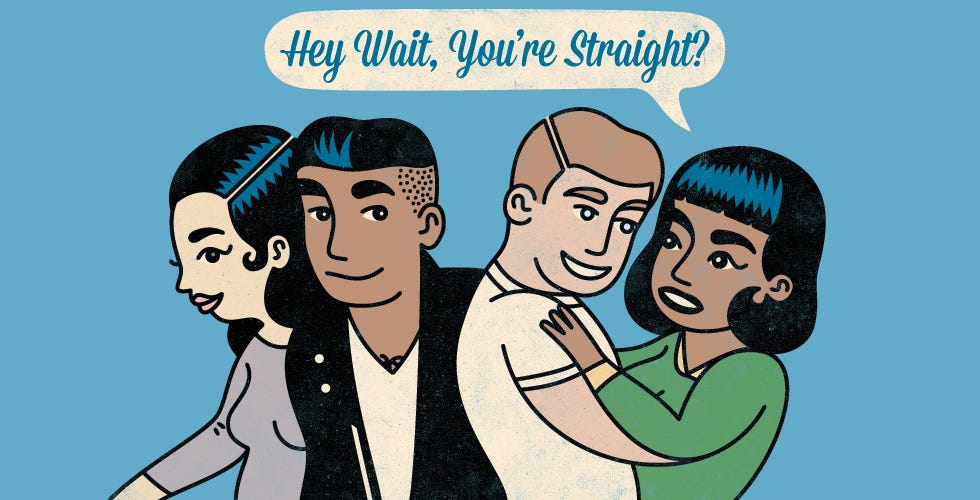
I was the first person to assume I was gay.
As a kid, I talked with a lisp and hated sports, and I preferred to sing and study. At some point, I learned that these are stereotypically gay male traits, and then I knew: I was going to grow up to be a gay man.
Sign up for The Bold Italic newsletter to get the best of the Bay Area in your inbox every week.
I was wrong. But I wasn’t alone in my assumptions, nor was I the last to make them. For example, the most recent girl I kissed — and the one before that, and so on — drew back from my face, laughing. “Wait, you’re straight?” she asked incredulously. It didn’t help that this was my neighbor, a friend who had observed my comings and goings for months.
Folks back home with suspicions about my sexuality weren’t surprised to hear that I was moving to San Francisco. If the world at large is heteronormative — forcing queer people to contend with a culture that assumes that straight is normal — here in San Francisco, it might be fair to say that we’re somehwat homonormative. That is, we assume all men and women might not be so straight, or we remove our assumptions from the picture altogether. Straight women have to wonder if even the most masculine men aren’t into them. I think it’s better that way.
No one wants to live in a box, and a presumed standard of straightness can be a straight jacket.
But in our historically queer capital and urban America generally, effeminate straight men like me are often presumed to be gay until proven otherwise. Is my experience the flipside of the old normal?
It’s an odd state of affairs, but I’m not complaining. Maybe that’s because I’m so frequently misread as gay that I’ve come to identify closely with queer people. In college, I concentrated in lesbian and gay studies, and these days I write about queer issues and events. Perhaps this adds to the confusion, as do my female roommates and meticulous wardrobe, but I don’t mind. Nor do I categorically correct folks who assume I’m gay. “Sure you’re not,” I’m used to hearing them say, or “You know, there’s nothing wrong with being gay.” Whoa, newsflash!
Personally, I think sexual ambiguity can be sexy and powerful — that’s part of why I don’t mind the confusion. Not everyone agrees, and so not all women go for femme or bi guys. That’s cool with me. And yes, my “vibes” or whatever they are can confuse gay guys. I’m not bragging here.
When nice men hit on me, I’m always flattered and a little sorry I can’t help them out.
Socially, I’ve even come to enjoy passing as gay. I don’t want to feel like I’m misleading people, but it’s fascinating to let others’ assumptions run wild. Women who think I’m gay talk to me about shopping, which is perfect, because I love shopping, and everyone always mentions their best gay friends to me.
The thing is, people are always “coming out” in little ways, mentioning a boyfriend or a wife in conversation, or commenting on their attractions or sexploits. I don’t seek to suppress sexuality altogether, but especially in a work environment or with new friends, I don’t want to impose my (normative) sexuality on anyone. Is this some misguided form of straight guilt? By using neutral pronouns and descriptors in the way I speak, am I being politically sensitive or just cultivating misperception? Most problematic of all, am I unfairly appropriating queer culture, hoping for some kind of privilege or a certain kind of respect? Or instead am I forgoing the straight privileges most of us take for granted? Frankly, I don’t know.
Maybe passing as gay is my form of “drag:” a kind of liberating performance that reveals how we’re really performing all the time. Men can be so preoccupied with seeming straight or masculine. It’s nice to be relieved of that impulse, to feel like I can just be myself and let others think what they want.
And maybe this is crazy, but I feel like there’s something genuinely queer about passing as queer.
I know what it’s like to live in the shadow of people’s assumptions, and I also know what it’s like to defy them.
I’ve even found that there are advantages to being perceived as gay. Professionally, I’ve been given license to write about gay and lesbian topics and events that I’m genuinely interested in and knowledgeable about, with authority to express my opinions about them. Covering the Supreme Court’s rulings on marriage equality in 2015, I was asked to report in the Castro. “I mean, he is the gay reporter,” said a colleague. Afraid to challenge him, my superior in front of a crowded room, I just agreed. I wanted the story, after all.
Those rulings are just the beginning, not the culmination, of a larger change in American society as queer culture joins the mainstream. San Francisco is changing too. Some say our city is becoming less gay. But I say that in some ways queer culture is getting queerer — and mainstream culture with it. For gay men, types like the “gaybro” and the “bear” are exploding the assumptions we make about masculinity, femininity and sexuality. Maybe we’re not homonormative or heteronormative but rather just less normative, which reflects the fact that sexual variety is the only normal.
We’re finally realizing and expressing how many ways there are to be gay and straight.
I’m proud to be on that shifting spectrum, challenging a false equivalence between sexuality and gender expression. Sure, a queerer world might be a more confusing one, but it also promises to be a place where individuals can be whoever they are.

The Bold Italic is a non-profit media organization that’s brought to you by GrowSF, and we publish first-person perspectives about San Francisco and the Bay Area. Donate to us today.







